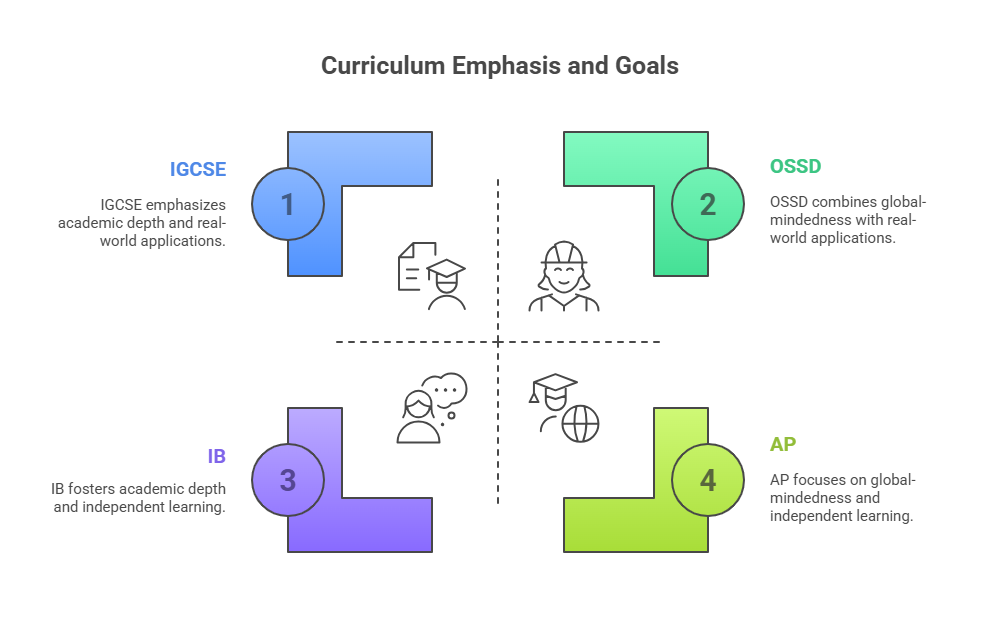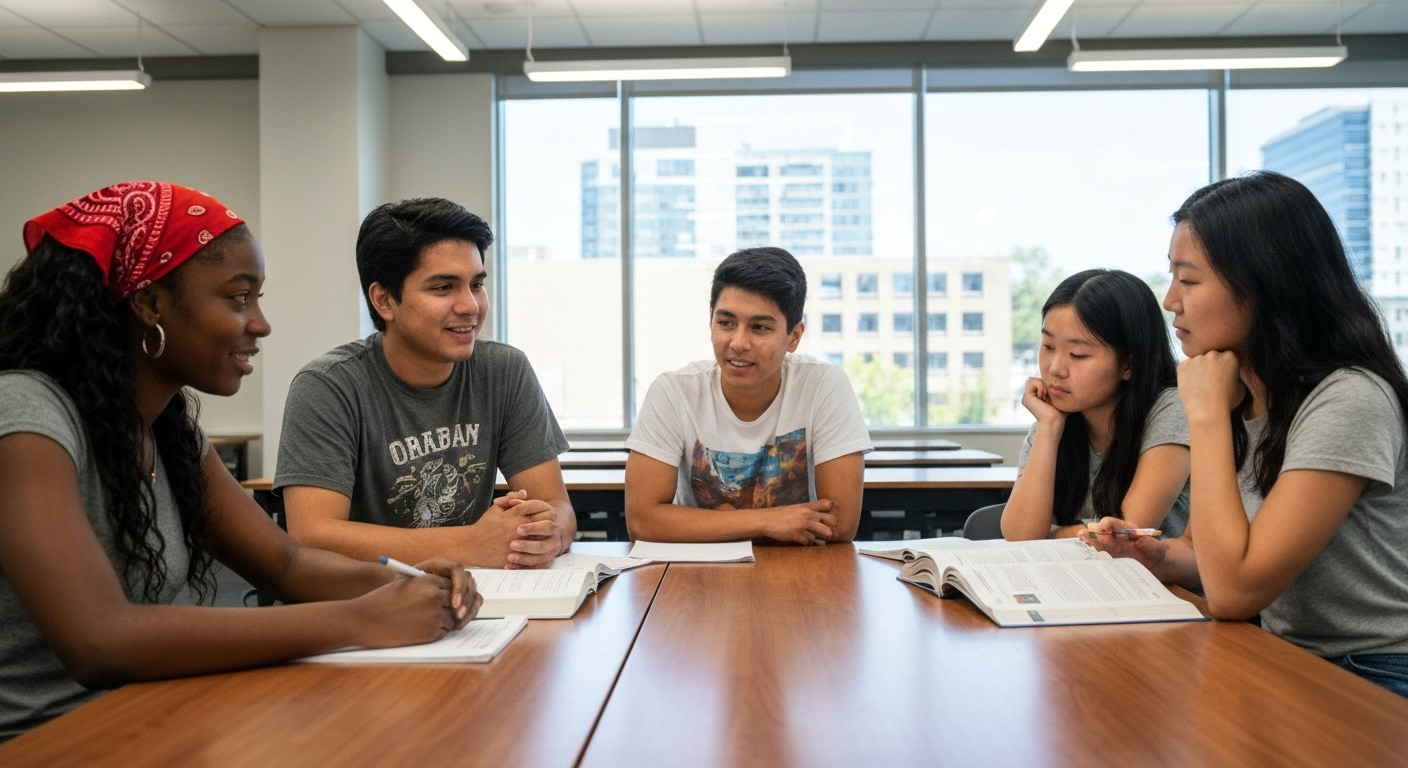Introduction
Many people have questions in their minds about what is an international school. An international school refers to a learning institution that provides an internationally based curriculum that is meant to suit a globally based student body. Its unique character is an international reputation of academic programs, a multicultural student body, and a mutual focus on cross-cultural study. International schools use internationally accepted curriculums (e.g. International Baccalaureate (IB), Cambridge or American) compared to local schools, which may be following a national curriculum, and Many teach primarily in English, though other languages like French or Spanish are common. For globally mobile families, understanding what an international school is becomes essential.
This topic grows increasingly relevant for families due to rising worldwide mobility. Because international higher education ambitions, international mobility, and soft skills, such as adaptability and intercultural communication, are becoming increasingly popular. To address these needs, International schools provide multicultural environments to develop global citizenship, worldwide leadership and academic excellence.
Let’s examine the advantages, curricula, and selection criteria. An important question for globally minded families is what is an international baccalaureate school is, which offers IB programmes that emphasise inquiry, critical thinking, and international values.
What is an international school?
An international school is an educational institution that offers a globally recognized curriculum, such as the International Baccalaureate (IB), British (IGCSE/A-Levels), American (AP), or Canadian OSSD is designed to cater students from diverse cultural and national backgrounds. These schools emphasize multilingualism, cross-cultural understanding, and academic excellence, often taught by globally trained educators. In today’s interconnected world, international schools matter more than ever as they prepare students to thrive in global universities, multicultural workplaces, and rapidly evolving societies by fostering critical thinking, adaptability, and a global mindset.
Features of an International School?
Key characteristics include:
- Internationally recognised academic framework(e.g., IB, IGCSE, AP)
- English as the main instructional language
- Globally diverse student body
- Focus on soft skills, leadership, and global readiness
Why Choose an International School?
There are many potential benefits for parents that make them choose an international school besides conventional schooling. Such educational institutions combine exceptional quality of education, multicultural atmosphere, and preparedness for the future, which is quite attractive to international oriented families.
- Provides a competitive edge for admission to global universities.:
International schools usually run an international academic framework like the International Baccalaureate (IB), Cambridge IGCSE, American or AP. These programs are demanding academically and focus on critical thinking, learning by inquiry and global awareness, which are concepts better suited to competitive colleges anywhere in the world.
- Contact with Other Cultures Knits a Feeling of Empathy and Tolerance:
International schools allow cultural exchange to take place as students and staff are usually from a great variety of countries. The children are growing up to be more comfortable with the idea of diversity, intercultural communication, and expanding their worldview, which is the most crucial trait in the globalised world.
- Recent ideas in instruction encourage creativeness and teamwork:
Project-based learning, digital literacy and student-led inquiry are taught in international schools instead of rote learning. The new approaches to the process also teach the students to take an active role in their learning, fostering such behaviours as cooperation, creativity, and flexibility.
- Reduced Class Sizes by ensuring Personal attention:
International schools also have a smaller ratio of students to teachers, which makes it easier to offer individual attention. Educators will be able to see the fortes and weaknesses of the students and thus make learning more individualised and efficient.
- The Ideology of Holistic Learning:
In addition to studies, international schools usually put a strong focus on the holistic maturation of a child socially, emotionally, physically and ethically. The school experience is integrated to grow well-rounded, responsible global citizens through co-curricular activities, leadership opportunities, and service learning.
While many families plan for overseas university study, international schools prepare local students with the globally valued attributes of curiosity, cultural competence, and critical thinking – essential for thriving in any part of the world.
Understanding International School Curriculums
Students aiming for global universities often wonder what an international high school diploma is, which is a qualification like the IB Diploma or A-Levels accepted worldwide.
Popular Curriculums
- International Baccalaureate (IB)
- Cambridge IGCSE and A-Levels
- American Curriculum (Advanced Placement – AP)
- Ontario Secondary School Diploma (OSSD) — common in Canadian international schools (See more on the OSSD course)

Curriculum Impact
Each curriculum emphasises different academic goals:
- IB fosters inquiry, reflection, and global-mindedness.
- IGCSE emphasises academic depth and independent learning.
- OSSD combines academic rigour with real-world applications (Explore international school in Canada).
Inside an International Baccalaureate (IB) School
An International Baccalaureate (IB) school offers a more dynamic and inquiry-based education with an aim of producing holistic global citizens. The curriculum has a wide range and a balanced approach which focuses on critical thinking, research skills and application of the real world. The IB philosophy promotes cultural awareness and intellectual honesty at all grade levels. The community project encourages students to be more proactive and community-minded, provides a creative outlet, and involves project-based problem-solving.
What Makes a School an IB World School?
An institution that has to be known as an IB World School has to undergo a severe authorisation procedure carried out by the International Baccalaureate Organisation (IBO). This incorporates adherence to high standards on teaching practices, leadership, delivery and assessment of curriculums and students. Special IB training should be given to the faculty members so that they can guarantee that they support the philosophy of the education program. In addition to the sterling academic performance, the school should also have a firm emphasis on international-mindedness where students are open-minded, culturally sensitive and ready to tackle global problems. Constant assessment will help to ensure continual upholding of these standards.
Differences Between IB PYP, MYP, and Diploma Programme
- Primary Years Programme (PYP) Age (3-12)
Inquiry-based learning cultivates curiosity and forms a habit of lifelong learning in the PYP. It is child-centred, puts an emphasis on the development of the entire child, promotes exploring, creativity, and reflecting. They teach students in thematic units linking the area together and promoting real-life comprehension.
- Middle Years Programme (MYP) Age(11-16)
The MYP is a step up from the PYP and brings more structured learning, but still focuses on interdisciplinary skills as well. The personal projects and the problem-solving tasks enable the students to form the links between the spheres that they study and the surrounding reality, to serve the community, and to acquire critical-thinking skills.
- Diploma Programme (DP) – ( 16 19) years old
The DP is an internationally recognised two-year university preparatory course that is also demanding. There are six groups of subjects, and there are core elements: Theory of Knowledge (TOK), Extended Essay (EE), and Creativity, Activity, Service (CAS). It is thought-provoking to students, promoting balance, morals, and leadership.
What Is an International Baccalaureate High School Experience Like?
An IB high school education is intellectually demanding as well as life-changing. Students do not simply study topics; they explore research-oriented projects, participate in highly critical philosophical study through Theory of Knowledge (TOK), and pursue a 4,000-word Extended Essay that teaches skills of writing demanded of them at the university level.
In addition to academics, the Creativity, Activity, Service (CAS) component leads students to activities in arts, sports and working in the community and helps develop values of empathy, leadership and balance. The IB learners are prepared to be international thinkers, who can analyse the problems of the real world in more than one way, so they are not only ready to join the best universities, but also to take life as a part of an active, responsible citizen of the world.
What Does an International High School Offer?
An international high school provides a curriculum that is internationally oriented to prepare students to join universities spread around the globe. It facilitates the respect of different cultures, multi-lingual acquisition, and critical thinking with the varied subjects and educational practices. The students get small classes, state-of-the-art facilities, and one-on-one expertise. The atmosphere promotes leadership, creativity, and global citizen.
Academics and Extracurriculars in Global High Schools
Global high schools offer an all-around kind of education through teaching intense academic courses together with an expansive extracurricular program. Arts, music, drama, sport, debate, Model United Nations (MUN) and community service activities are some of the activities that students can engage in. It is not an additional activity tacked on to the game; it is a necessary part of leadership creation, creativity, teamwork, and time management. This moderated philosophy helps students become more intelligent and well-rounded, and they are ready to face a vibrant future.
What Is an International High School Diploma Worth?
According to the International Baccalaureate Organisation (IBO), IB Diploma graduates have significantly higher university acceptance rates globally (IBO, 2023 Global Pathways Report). It is not just an indication of high academic performance but also essential skills such as research, communication, critical thinking, and cross-cultural awareness. In college admission and scholarship programs, graduates have a higher chance of getting results. The diploma will demonstrate not only the academic rigour but also a willingness to succeed in a wide variety of settings, as the job market is becoming more international. Many students benefit from international school scholarships, which provide financial support based on merit, talent, or financial need.
Transitioning from Local to International High Schools
To understand what is an international baccalaureate high school is a school that delivers the IB Diploma Programme, preparing students aged 16–19 for academic and global success. Choosing an international high school instead of a local school can be a large step with new approaches to classroom studies, classroom interactions, and a multicultural setting. Although students might have a hard time at first with language or assessments that they were not used to, they grow rapidly in resilience, open-mindedness and independence with academia. With time, many will develop confidence, world-view and excel in the more personalised and global-oriented study environment.
International Schools vs Local Schools: What’s the Difference?
When comparing an international school vs a local school, the key differences lie in curriculum style, cultural exposure, and global recognition.
| Feature | International School | Local School |
| Curriculum | IB, IGCSE, AP, OSSD | CBSE, ICSE, State Boards |
| Language of Instruction | English (mostly) | Local languages, English |
| Teaching Style | Student-centred, inquiry-driven | Exam-focused, structured |
| Cultural Exposure | High – global peers and festivals | Low to moderate |
| Cost | Higher | Moderate to low |
| University Pathways | Global opportunities | Mostly domestic |
Exploring Scholarships in International Schools
Most international schools provide scholarships on academic grounds, on leadership aspirations, artistic capabilities, or on a financial basis. This will bring good education within the reach of needy students of various backgrounds through such scholarships. Awards can defray either part or all of the tuition fees, and in some cases, a grant towards books or extra-curricular activities. Selection usually entails trials, examination, and an evaluation with regard to prior accomplishments.
Types of Scholarships Offered
1. Merit-based Scholarships
These are awarded to students who have strong academic performance, excellent grades, or high test scores. Schools reward students for their achievements and potential.
2. Need-based Aid
This type of financial help is given to students based on their family’s income. If a student’s family cannot afford the full tuition, they may qualify for support.
3. Talent Scholarships (Sports, Arts, STEM)
These are given to students who show special skills or talent in areas like sports, music, art, science, or technology. It’s a way to support students who shine beyond academics.
Eligibility and Application Tips
- Maintain a strong academic record
- Participate in extracurriculars and community service
- Prepare a compelling personal statement
Smart Financial Planning
Plan early for tuition and living expenses. Consult school counsellors for financial aid options and budgeting advice.
A Smart Parent’s Guide to Choosing the Right International School
The criteria that should be used to select the best international school include curriculum, teaching standards, student services and cultural compatibility. The intelligent parents consider accreditation, university placements history, the number of their classes and extra activities. It is possible to talk to current families as well as visit the campus. Finally, the best school is the one that fits your child, in terms of his/her way of learning and his/her interests, as well as his/her future plans.
What to Ask During School Visits
- What is the student-teacher ratio?
- How are soft skills and global competencies taught?
- What does a typical day look like for students?
Accreditation, Faculty, and School Ethos
Ensure the school is accredited by trusted bodies (IBO, CIS, Cambridge) and led by globally experienced faculty with modern teaching methodologies.
Community Feedback and Rankings
Look for parent reviews, alumni feedback, and rankings in international school listings. Consider how well the school supports student well-being and career pathways.
Conclusion
International schools offer more than just academic excellence and they nurture global perspectives, communication skills, and cultural adaptability. With unique curricula, personalised learning environments, and a strong emphasis on real-world skills, international schools prepare students to thrive anywhere in the world. USCA Academy is one such institution that offers a globally recognised education tailored to individual success.
Whether you’re seeking an international school in Canada or planning to study in Canada for international students, choosing the right school can shape your child’s future.
Ready to take the next step? Explore international school options near you or book a consultation with an education advisor today.
Frequently Asked Questions About What Is an International School
1. Can local students join international schools?
Yes, the international schools are popular among the local students because of the excellent education system and international exposure. These schools offer a holistic experience that encourages globalisation, leadership success and critical analysis. International schools are frequently selected as an option by the local families seeking education for their children to assure them of admission into universities abroad or careers in the international industries, without even leaving their home country.
2. Do international schools have CBSE?
No, the majority of international schools do not follow the CBSE curriculum. In such cases, they usually have internationally accepted qualifications such as the International Baccalaureate (IB), IGCSE, A-Levels or Ontario Secondary School Diploma (OSSD). These curricula are inquiry-based, global in thinking, and skills-oriented rather than learning by rote and hence larger families are enrolling in an international standard of education.
3. Is an international school better than ICSE?
It will be based on your child’s objectives and learning patterns. International schools are given an international curriculum, Project-based learning, and a wide range of recognition by universities. Conversely, ICSE is characterised by the academic standards, good language foundation and structured examinations. When seeking international admission to a university or all-around development, then the international schools are that much flexible and expose one to the world.
4. What is the speciality of an international school?
The international school speciality is that it grows to be global citizen. These schools embrace global readiness, cross-cultural knowledge and critical thinking. They maintain small classes, international faculty and student communities creating a special learning environment within which students are asked to seek, connect, and own their learning experiences.
5. Is an international school good for kids?
Absolutely, international schools are particularly advantageous to children who favour the notion of holistic development, multinational education, and international exposure. The school curriculum extends to encompass service learning, arts, sports and life skills. This also teaches them to be confident, explore and adapt to new things, and these are qualities that make them emerge successful in this fast-changing world.









